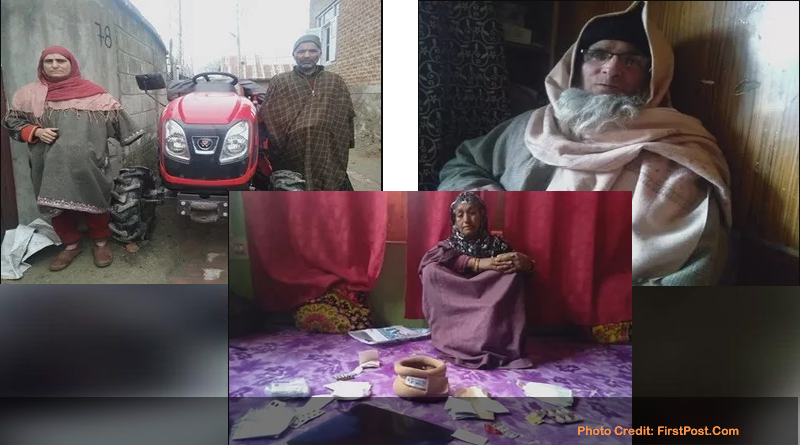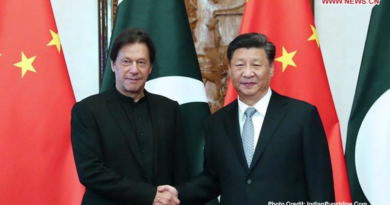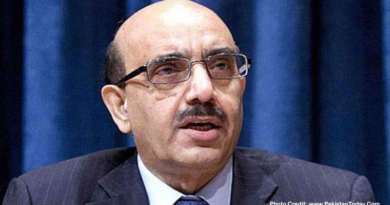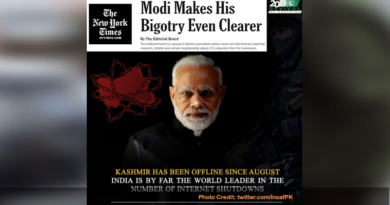157 days since abrogation of Article 370 in Jammu and Kashmir, families struggle as kin languish in faraway jails
- Over 400 Kashmiris, booked under the Public Safety Act after the scrapping of Article 370, were taken to different jails where they remain lodged to this day
- Meanwhile, their families continue to struggle with legal battles amid mounting hardships — financial and otherwise
- At first, families were caught unawares about the whereabouts of those who were arrested
- It took them weeks to locate their loved ones in different jails outside Kashmir
After scrapping Article 370 on 5 August last year, the Central government launched a massive crackdown in the region detaining people including mainstream and separatist leaders — many of whom continue to be incarcerated in different jails far from their homes.
More than 400 of them were booked under the Public Safety Act (PSA) and were taken to different jails. They remain there under detention as their families struggle with legal battles amid mounting hardships. As the government imposed a strict communication clampdown in the region following the abrogation of the law, families were caught unawares about the whereabouts of those who were arrested. It took them weeks to locate their loved ones in different jails outside Kashmir.
One such case was that of Manzoor Ahmad, a shopkeeper from south Kashmir’s Pulwama.
Forty-six-year-old Manzoor Ahmad Lone was arrested on 2 August after the police conducted a raid at his residence in Pulwama’s Kakapora village. For three days, the family had no information where Lone was lodged by the police and on 5 August, when Article 370 was scrapped and the Valley was put under strict curfew, his family learnt that he was at the Kakapora Police Station.
From Kakpora, Lone was shifted to the central jail in Srinagar’s Rainawari, and then taken to a jail in Agra on 10 August. Lone has a wife, Parveena Bano, and two children aged 22 and 19 years.
As per his family, the police has slapped prior charges — that date back to he was associated with the Hurriyat in the past — against Lone. However, he left the organisation after being charged under the PSA in 2016. “At the time, he was kept in jail in Kathua for almost eight months. And after his release, he left the Hurriyat. But now, he has been charged for no reason,” said Imtiyaz Ahmad, his son.
As per Lone’s dossier, he has been charged with “instigating youths” to pelt stones, but his family insists that the allegations are baseless. “My father is too old to be involved in such things, he was just keeping himself busy in his shop,” said Imtiyaz, a Class 11 student, adding, “Who will run my father’s shop, and who will feed my family?”
***
While Lone’s family struggles to find answers for his arrest, Mohammad Maqbool Hurrah, a 51-year-old living in Gulbagh Kakapora — a village in Pulwama district — has maintained a notebook in which he has written all the debts he took from neighbours and relatives ever since his 26-year-old son Irfan Ahmad Hurrah was detained under the PSA. Hurrah Sr is contemplating selling his land to pay his loans. “I don’t have any other option,” he added. Quratulain Rehbar
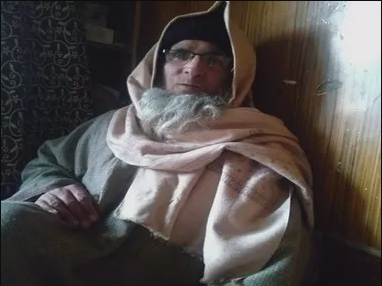
On 3 August, when the Valley was abuzz with rumours and a sense of foreboding, two police officers from Kakapora Police Station arrived at the Hurrah residence to enquire after the whereabouts of his son. “We had no idea why they were asking about him; Irfan would have been in a Darul Uloom with students, so I told them he would probably be there,” said the father.
On 4 August, police arrested Irfan from a hostel in Kakapora, where he was teaching the Quran to local boys. The police didn’t tell the family the reason for his arrest. “They just told us that he will be safe in the police station,” said Hurrah Sr. A day after the abrogation of Article 370, the communication blackout in the Valley left Irfan’s family with no means to get information about where he had been taken. “We went to meet officers in Pulwama and requested a curfew pass. I just wanted to locate my son,” said Irfan’s father, who would go to find out 16 days later from central jail authorities that he had been taken to an Uttar Pradesh jail. “I took fruits and clothes for him, but was told that he had been shifted,” he added.
Irfan, who was the lone breadwinner of his family, was teaching Arabic and Quran to students in Shah-i-Hamdan Pampore, a local school for religious education. Irfan had studied till Class 9, but then sought admission at a Darul Uloom in Srinagar, where he studied for three years.
Lawyers in Kashmir said in various reports that most of the people charged under the PSA have been detained on grounds of “likely to disturb public order”, in accordance with Section 3 of the Act. Irfan’s dossier reads, “He has done his post graduation in Arabic from Kashmir University.” This shocked that family who pointed out that he hasn’t even attended higher secondary school.
The family feels that Irfan was arrested because of his religious leanings. “Is it a sin to follow one’s own religion?” asked his father, who has undergone surgery on both his eyes recently and is unable to earn a living for his family. Before this, there had never been any charges filed against Irfan. It was only in October, a month-and-a-half since Irfan was picked up, that Hurrah Sr was able to meet his son in the Uttar Pradesh jail. It was then that he started taking loans from people in his village due to his own financial strain.
Ever since their last meeting, the Hurrah family was hopeful that their son was in good health despite being in jail. This was until the most recent meeting on 17 December.
It took four days for the family to travel by train to Uttar Pradesh and meet their son, but what greeted them was most unexpected. When Hurrah Sr entered a meeting room at the police station, and hugged his son, Irfan told him that he had been tortured. These were the only words he could uttered. “We were not allowed to talk in Kashmiri, so we couldn’t discuss the whole matter,” said the father. “I don’t know much Hindi. I was just staring at my son and tears were rolling down my face,” he added, “We just exchanged glances helplessly without talking much.”
Irfan showed his father his injured foot saying that he might require surgery, but wasn’t sure who would be able to operate on him there. Since then, the family has been quite worried. “We cannot bear to see him like that. He should at least have been shifted to Kashmir,” said Hurrah Sr.
***
Arranging a meet with their kin in outside jails is a long struggle for families mostly due to the difficult financial conditions.
As per the recent report by the Jammu and Kashmir Coalition of Civil Society and Association of Parents of Disappeared Persons (APDP), nearly 37.4 percent of the detainees in PSA-related cases have been moved to jails in various states across the country. The report mentions that 662 people were charged under the PSA in 2019, of which 412 cases were recorded after 5 August.
Another resident of Pulwama, 45-year-old Abdul Rashid Dar from Mohenveji Kakapora, was arrested in a night raid on 5 August and security personnel didn’t cite the reason for his arrest to his family. Zeba Bano, Dar’s 43-year-old wife, said that her husband has never been taken to a police station before, but had now been charged under the PSA. On the night of 5 August, police and CRPF personnel knocked on Dar’s door and told him to accompany them. “They just told us he has to go with them while they search a house nearby,” said Zeba.
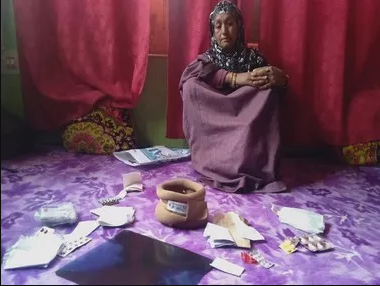
Zeba suffers from a heart ailment and has been on medication ever since her husband was arrested. Her 21-year-old daughter Saima, who is taking care of her mother, is clueless about the reason for her father’s arrest. “She keeps asking me when her father will be released,” sobbed Zeba.
It was only nine days after he was picked up that Dar’s family learnt he was at the Kakapora Police Station. Two-and-a-half months later, he was moved to a jail in Agra without his family being informed. In Agra, around 84 people from the Valley remain imprisoned and at district jail in Uttar Pradesh’s Ambedkar Nagar, around 60 people from Kashmir are under detention. Dar, a driver and the lone bread-winner of his family, has two children and a wife who are waiting for his release. “If they are not going to release my husband, they should arrest us as well,” said Zeba.
While the families continue to suffer after the detention of their bread-winners, the police dossiers read somewhat similarly for all of them, charging them with “stone-pelting” and “disturbing law and order”. In Kashmir, following the abrogation of Article 370, there have been very few protests as the region has been under a strict blockade. The families question the detention of their kin and say that “most of them were falsely charged on weak grounds”.
***
A few kilometres away from the main town in Pulwama, Pahoo is a quiet village surrounded by apple orchards. Fayaz Ahmad, a 26-year-old from the village, was among hundreds slapped with the PSA and shifted to Bareilly after he was charged for “stone-pelting”, as per his dossier.
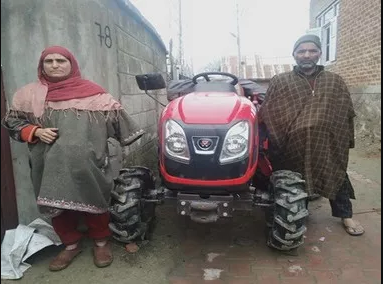
Fayaz was in the middle of his PhD in Arabic, having completed his Masters from the University of Kashmir. According to his father, Abdul Rashid, Fayaz was falsely framed under prior charges and was “just keeping himself busy with a tractor — which was his part-time job”.
It has been six months and Rashid has only been able to visit his son once. “Since the past six months, our son hasn’t able to work or study. And as a result of him being jailed, our financial condition has worsened,” said his mother, Sara Bano. Fayaz’ family fears that by being charged under the PSA, “the authorities have jeopardised his career”.
***
In Parliament last October, Union Home Minister Amit Shah justified the arrests in Kashmir and maintained that less than 1,000 people from Kashmir were under detention and that 800 of them were “stone-pelters”. Earlier this month, the government released some politicians who had been detained following the 5 August crackdown. However, while most police officials approached for comment refused to speak about the PSA cases, one — on condition of anonymity — said that the government might release some political prisoners depending on the situation in Kashmir in the coming months.
Published in FirstPost.Com on 10-Jan-2020

